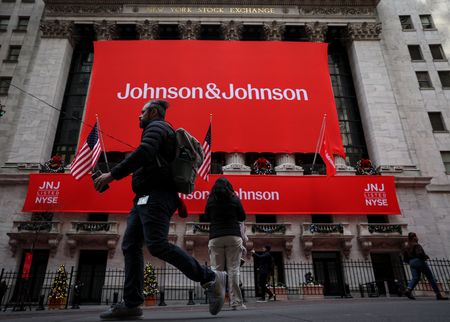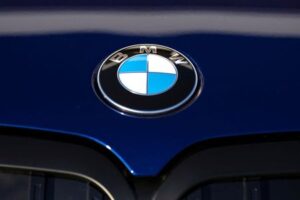By Patrick Wingrove and Bhanvi Satija
(Reuters) -Johnson & Johnson beat estimates for second-quarter profit and revenue on Wednesday, driven by strong sales of its drugs, including cancer treatment Darzalex and blockbuster psoriasis drug Stelara.
Stelara has long been a key driver of revenue growth for J&J, with analysts forecasting sales of over $10 billion this year. But this could fall to about $7 billion in 2025 when as many as six close copies of the drug are due to launch in the U.S.
Shares of the drug and medical device maker were up nearly 3% at $155.4 in morning trading.
J&J Chief Financial Officer Joe Wolk said he expected to finalize contracts within the next three months that would determine favorable U.S. insurance coverage for Stelara in 2025.
“I’ll remind you that we are still calling for growth in our pharmaceutical business despite the biosimilar competition that we intend to encounter next year,” he said.
In the second-quarter, Stelara sales rose 3.1% to $2.89 billion, topping analysts’ estimate of $2.77 billion according to LSEG data. Sales of blood cancer drug Darzalex rose 18.4% to $2.88 billion, edging past LSEG estimates of $2.86 billion.
Wolk said on a post-earnings conference call that sales growth for the company’s pharmaceuticals business will be lower in the second half of this year as Stelara biosimilars enter the Europe market later this month.
Total revenue of $22.4 billion surpassed the consensus estimate of $22.3 billion, according to LSEG data. Adjusted earnings of $2.82 per share beat analysts’ expectations of $2.70 per share.
The New Jersey-based drugmaker said it now expected total 2024 sales of $89.2 billion to $89.6 billion, compared with its prior forecast of $88.7 billion to $89.1 billion.
J&J also lowered its annual per-share forecast to a range of $10 to $10.10 from $10.60 to $10.75, which includes a 68-cent hit from costs related to deals including its $13 billion purchase of cardiac medical device company Shockwave.
That was among J&J’s several deals this year, including its May purchase of experimental skin disorder drugs in two acquisitions worth $2.1 billion.
TALC OVERHANG, SOFTNESS IN MEDICAL DEVICES UNIT
J&J shares also lifted stocks of other device manufacturers, with Abbott, Stryker and Medtronic rising about 3% each on Wednesday.
Sales for its medical technology business rose 2.2% to $7.96 billion from $7.79 billion a year earlier, but fell short of analysts’ estimate of $8.17 billion as sales of its surgical devices declined from last year.
“We’d like to see MedTech grow a bit faster than that,” said James Harlow, senior vice president at Novare Capital Management, which owns about 138,000 shares of J&J.
J&J said sales of devices used in surgeries was hurt by competition and supply constraints, as well as lower demand for bariatric procedures. Finance chief Wolk said on the conference call that sales from its vision business and in China were lower than expected.
“China … right now is a very volatile market,” he said, adding that negotiations with China over bulk buying of medical devices could be a “short-term pain” for J&J.
J&J investors have also been waiting for a decision on lawsuits that the company has been facing related to its talc products.
J&J still faces tens of thousands of lawsuits alleging that its talc-based products caused cancer. Several claimants face a July 26 deadline to vote on J&J’s third attempt of a bankruptcy maneuver for a subsidiary that would limit the drugmaker’s liability and set up a fund to pay victims.
J&J’s Wolk said the company in recent weeks had got endorsements for the settlement from three major law firms representing claimants.
“It’s going to be hard for the stock to get going until we get some kind of resolution on talc and a little bit more certainty on the contours of that (sales) erosion on Stelara,” said Harlow.
(Reporting by Patrick Wingrove in New York and Mariam Sunny and Bhanvi Satija in Bengaluru; Editing by Richard Chang, Anil D’Silva and Nick Zieminski)





